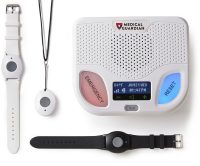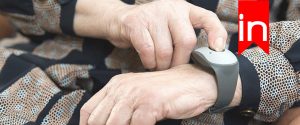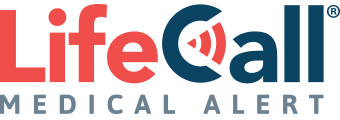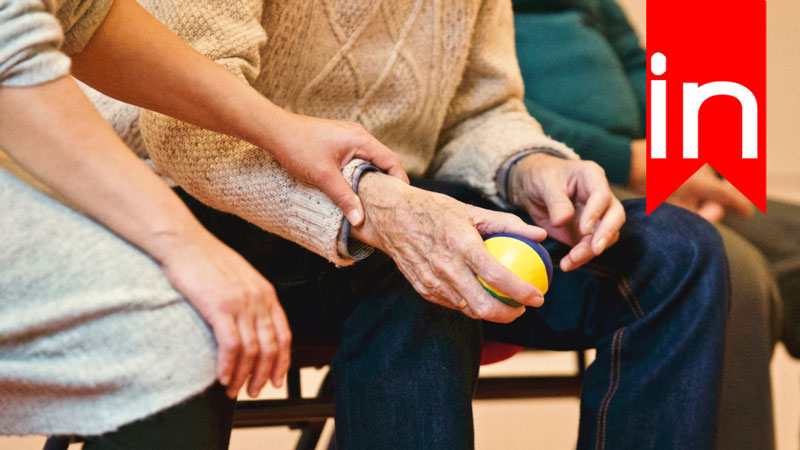
The elderly are prone to falls and suffer from chronic health problems that could be life threatening if not attended to immediately. Even if treated, it may leave them immobile or with limited mobility, which can further lead to other physical and mental health issues.
With a medical alert system, they can rouse help in case of an emergency to get timely help. Often, the elderly restrict their movements and social life for fear of falls, but with a device like this, they can move more freely, knowing they will be attended to in case the need arises.
Typically, a medical alert device consists of a base unit, a portable emergency help button that can be worn like a bracelet or a neck pendant. The button triggers a small radio transmitter in the base station that is connected to a personal emergency response system (PERS) automatically, which could be a mobile phone or a landline receptor, and alerts a trained care professional.
Unmonitored Systems with No Monthly Fees
There are some unmonitored medical alert systems available. In such devices, where there is no monthly fee or a very low initial cost, users can provide the numbers of emergency contacts who are alerted when the button is pressed during an emergency. In case the first one does not respond, it dials the next one and so on. If no one responds, then it finally dials 911.popular Medical Alert Systems without monthly fees & Charges:
Monitored vs. Non-Monitored Systems
In a monitored medical alert system, the device is connected to an emergency response system manned by a trained operator who guides you at the time of crisis. They will also contact a caregiver, friend or family member or 911, depending on the need. In an unmonitored system, if the first contact listed in the device is not available, then there could be a time lapse before any of the other contacts are reached. This could mean loss of valuable time by when the situation could worsen. Secondly, even if the contact responds, the situation may be beyond their understanding. For instance, if there is a stroke or a cardiac arrest, they may not know how to help the patient. While the trained professional could quickly arrange for an ambulance, the contact may waste valuable minutes trying to first understand what is happening. Monitored systems come with fall detection and can send an alert in case of a fall. Unmonitored ones mostly don’t have this feature. GPS is another in-built feature in monitored medical alert systems for seniors that let the operator know the location of the user.The Cost Of A Monitored System
Unmonitored systems typically charge you for the device only since they do not offer monitoring services. But before signing the contract, read the fine print to make sure that there are no cancellation charges and that you get a free trial period. Also, in the monitored system, the fee you pay goes towards the monitoring. If you buy a device without monthly fees and then pay extra for monitoring, you may find it hard to keep up with their price hikes later.Ideal Uses for An Unmonitored System
An unmonitored system has several limitations and may not be the apt medical alert system for the seniors whose situation needs somebody to be ever alert. However, depending on the lifestyle and personal circumstances, unmonitored systems with no monthly fees may be preferred by those seniors who do not have a fixed income or pension and therefore prefer not to have recurring monthly fees.Types of Unmonitored Medical Alert System
 Unmonitored medical systems with no monthly fee come in more than one variety. So as you would for any other product, do a due diligence and read up before making your purchase.
Assess the level of activity of the older adult who is going to use it, whether he or she is more home bound or mobile. Whether they live alone or with a caretaker. This will determine whether you need a medical alert system that contacts external numbers or is needed for sending alarms inside the house. The range will be important in that case. It should be waterproof and easy to set up and use. Medical alert systems for seniors with no monthly fees should have a warranty, free trial with a return policy in case of dissatisfaction with the product.
If cost is a factor, there are low-cost alternatives for medical alert systems with monitoring.
Unmonitored medical systems with no monthly fee come in more than one variety. So as you would for any other product, do a due diligence and read up before making your purchase.
Assess the level of activity of the older adult who is going to use it, whether he or she is more home bound or mobile. Whether they live alone or with a caretaker. This will determine whether you need a medical alert system that contacts external numbers or is needed for sending alarms inside the house. The range will be important in that case. It should be waterproof and easy to set up and use. Medical alert systems for seniors with no monthly fees should have a warranty, free trial with a return policy in case of dissatisfaction with the product.
If cost is a factor, there are low-cost alternatives for medical alert systems with monitoring. We list below three types of medical alert systems that may be useful if you are looking for one:
Medical Alert

The Medical Alert At Home (No Landline System)
For those who may not have a landline system at home, this one wirelessly connects the user to the emergency response operators for any medical emergencies. It is a simple system with a base unit and an emergency button that can be worn as a pendant or a bracelet, and is waterproof.
This emergency call button for seniors comes with three payment options:
- A monthly plan of $32.95/month comes with a neck button and wrist button option. At just $10/month extra, you can also opt for the fall detection
- You can subscribe semi-annually at a lower cost of $29.95/month. In addition to the two buttons, you also get it shipped free. Add $10/month extra and you also get fall detection added in.
- You can opt for an annual subscription at $27.45, and one month free. You get a lockbox free in addition to free shipping and the two buttons. Fall detection costs just $9.17/month.
Check out the full Medical Alert review here.
Lifestation

In Home No Landline
This is yet another in-home no landline medical alert system that comes with three payment options:
- Standard package at $26.95 that includes free shipping, wireless medical alert equipment, activation, emergency button, wristband and necklace attachments and 24/7 monitoring from care specialists who are certified and UL listed.
- If you opt for Select, you get all the above plus a protection plan for $31.95
- Supreme at $41.95 also includes a lockbox
You can add fall detection at an additional fee.
Check out the full Lifestation review here.
Medical Guardian

Home Guardian (No Landline System)
Connected to a nationwide cellular network, this wearable emergency button for seniors works up to 600 feet of the base station, which alerts a 24×7 monitoring center.
- Subscriptions start from $1.12/day.
- Demi-fine jewellery designs are available, making it fashionable to wear one. You can also upgrade your package.
Check out the full Medical Guardian review here.
Medical alert systems are a great way for the seniors to feel safe and protected. They are available as monitored and unmonitored options. In the case of a monitored option, a click of a button connects the older adult in an emergency situation with a trained care operator who can guide or mobilize help as needed. But this involves a monthly subscription. For the elderly who do not want a monthly payment option, there are unmonitored emergency buttons with no monthly fee. Such devices have pre-programmed contacts that get alerted in case of an emergency. Choose the one that suits your needs and pocket. There are also options where the monthly fee may be low, and it may be better to opt for those rather than unmonitored ones since time is of essence in case of several emergencies.
Related Posts

Medical Alert Bracelet For Breast Cancer Patients: Essential Information for Emergencies
Read More

Medical Alert Watch With No Monthly Fee
Read More

Why Seniors Living At Home Need a Medical Alert System
Read More

Activities of Daily Living: A Comprehensive Guide to Maintaining Independence
Read More
Sponge Bath: Bed Bathing Seniors
Read More

Read More


LifeCall is an American company with a long history of providing excellent monitoring services and efficient emergency alert systems to health care facilities catering to the elderly and individuals for use both indoors and on the go all over the United States.
Call Now
1 (866) 225-1295
Read The Review

